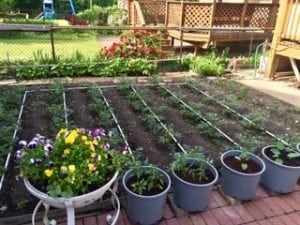Weeding Our Garden
All living things share a litany of commonalities. We’re comprised of carbon, we need nutrition in some way, shape or form, we benefit and get energy from sunlight, we need hydration, and the list goes on. When a child looks at a group of adults, they typically see no differences. For them, it’s a collection of individuals much older than they are and they tend to generalize them. They do not know or understand the difference between 20 somethings, middle aged individuals, or their great grandparents. Human nature is to cluster. We group like with like and spend little time differentiating based upon the finer details. It’s efficient and over time, it becomes second nature. Children tend to  cluster with less discrepancy than adults. Their clusters are greater in size, as they tend to lump a variety of ‘similar’ things together, that a person with more experience can differentiate. A great example is a garden. Everything that grows within it is the same to a child. They do not distinguish between tomatoes, peppers, beans, flowers, weeds, or grass. For them, everything is green and it’s all growing within a boundary; therefore, it’s all the same.
cluster with less discrepancy than adults. Their clusters are greater in size, as they tend to lump a variety of ‘similar’ things together, that a person with more experience can differentiate. A great example is a garden. Everything that grows within it is the same to a child. They do not distinguish between tomatoes, peppers, beans, flowers, weeds, or grass. For them, everything is green and it’s all growing within a boundary; therefore, it’s all the same.
When a child is asked to help ‘weed’ the garden, seldom do they understand the importance of this task from their vantage point. They will typically complain as they would rather do something not in the dirt and the task seems tedious. When one considers their inability to distinguish a difference between plants and weeds, their resistance and aversion makes complete sense. A child does not have the ability to understand that even though a weed looks very similar to a plant and they’re growing together, the weed is actually stealing from the plant. They do not realize its underground and unseen tentacles compete with the plant for precious nutrients within the soil and water. Subsequently, children are unable to comprehend how a garden full of weeds will prevent every plant within it from bearing the juicy and nutritious vegetables they are fully capable of. When left in place and allowed free reign, the weeds will prevent the plants from thriving and will eventually take over. They’re toxic to the health and longevity of all the beautiful, life-giving plants. A child does not understand this, because a child knows no difference between plants and weeds. As they age however and begin to understand the parasitical nature of weeds in conjunction with starting and maintaining their own gardens, they actively pursue and eradicate all weeds within them.
Seeing ourselves as one of those plants within the garden of Earth, our ability to thrive and our long-term health depends on limiting the weeds around us. Our ability to actualize our dreams, desires, and ambitions is greatly impeded by toxicity within our environment. If our proverbial soil isn’t nutrient rich with regular hydration, but instead overgrown with weeds, we are more likely to wilt and come up short. Our coming up short is not due to a lack of desire or effort from us, but a lack of support where we need it most. Just as plants need to be nourished and given an environment free from the weeds that steal what they need, we too need that environment. Despite our current inability to see it, our friends, family, co-workers, bosses, teammates, and everyone we allow into or around the garden that we inhabit could be a weed. They may not be overtly stealing nutrients and water from us, but their tentacles could be covertly sapping us of the energy, support, and love we need to be our very best. Toxicity comes in many shapes, sizes, and forms. It can subtly poison with no taste or discernable features as it feigns support. We know and more importantly, feel its indicators of being held back, weighted down with negativity or passive aggressive comments, continually giving more of our self than we will ever get back, and most scarily, the guilt over how they make us feel when we’re around them. Oftentimes, we tend to ignore our feelings or allow those individuals to continually subject us to their toxicity because of how much we revere and or love them. In continually granting them a pass, we enable their power to grow. Consequently, they get stronger, as we are being relegated to a less than 100% version of our self.
Weeding our garden is not easy. Eradicating people we’ve come to know and love over many, many years is painstaking as their roots run deep through our lives. However, OUR best interest, which oftentimes we seldom consider, and our ability to achieve our dreams, desires, and ambitions hinges on it.








